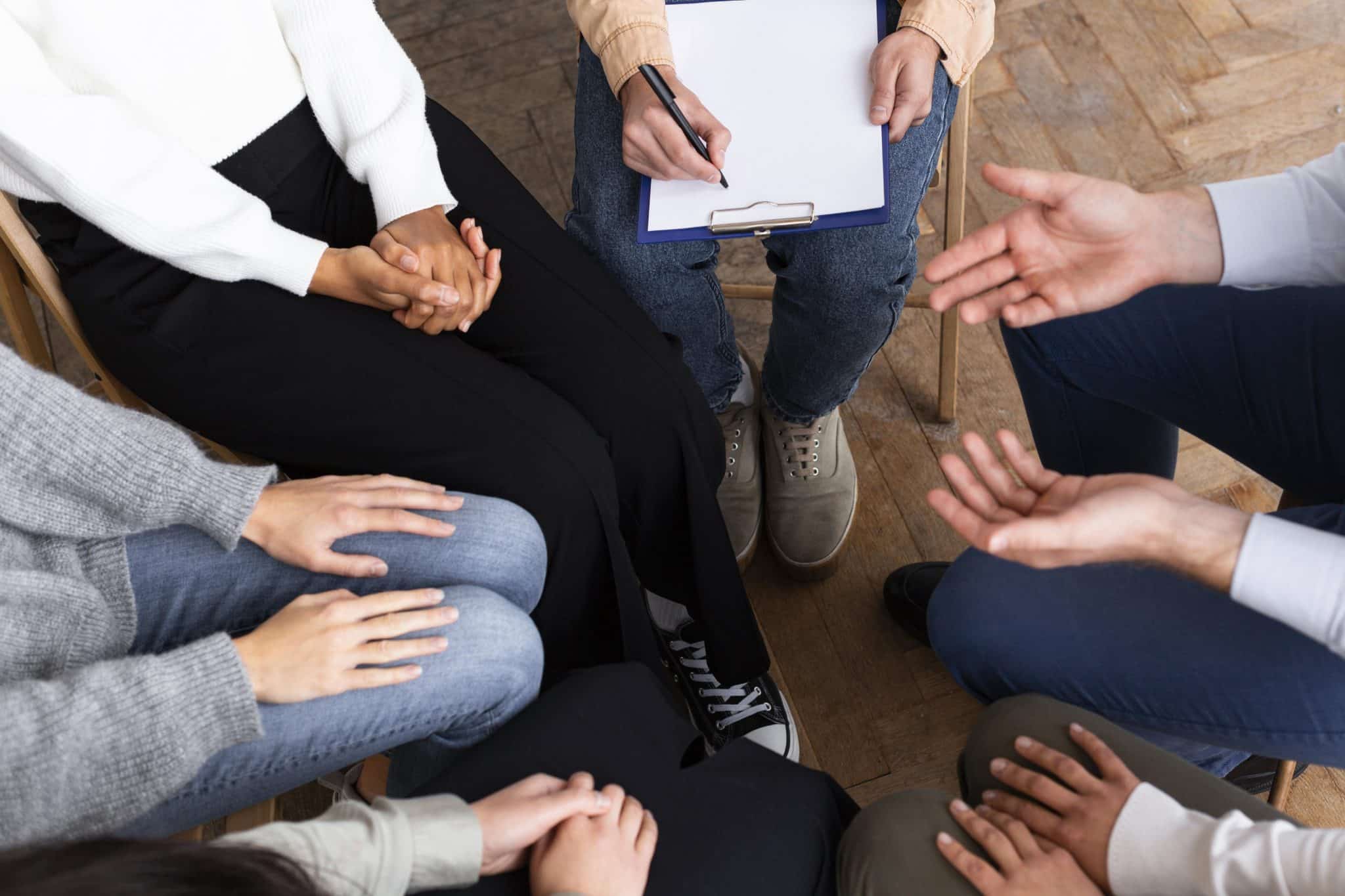Group therapy is an essential part of addiction treatment programs. It involves bringing together a group of individuals struggling with addiction to work together and support each other on their journey to recovery. This type of therapy can be very effective in helping individuals to overcome addiction and maintain long-term sobriety. In this blog, we will explore the benefits of group therapy in addiction treatment and how it works.
What is on this page
Benefits of Group Therapy in Addiction Treatment
- Provides a sense of community: One of the significant benefits of group therapy is that it provides a sense of community for people in recovery. Addiction can be a very isolating experience, and people may feel alone in their struggles. Group therapy can help combat this feeling by providing a safe and supportive environment where individuals can connect with others going through similar experiences.
- Offers a sense of accountability: Group therapy also offers a sense of accountability for individuals in recovery. When people are part of a group, they are more likely to be motivated to stay on track with their recovery goals. Knowing that others in the group count on them can be a powerful motivator.
- Provides feedback and support: In group therapy, individuals can receive feedback and support from others. This can be especially helpful when struggling with difficult emotions or facing challenges in their recovery. Hearing from others who have been through similar experiences can be validating and encouraging.
- Encourages socialisation: Group therapy can also encourage socialisation and help individuals to develop healthy relationships. Many individuals in recovery have struggled with social isolation and may have lost touch with friends and family members. Group therapy can provide an opportunity to connect with others and build a supportive network.
- Facilitates learning: Finally, group therapy can facilitate learning and help individuals to develop new coping skills. In a group setting, individuals can share their experiences and learn from others who have been through similar situations. This can be especially helpful when developing skills for managing stress, dealing with triggers, and maintaining sobriety.
How Group Therapy Works
Group therapy typically involves a trained therapist who leads the group and facilitates discussion. The therapist may use various techniques to encourage participation and engagement, such as asking open-ended questions, encouraging members to share their experiences, and using role-playing exercises.
Depending on the program, the group may meet regularly, such as once or several times a week. Depending on the group’s needs, the sessions may last anywhere from 60 minutes to several hours.

These may include:
- Sharing personal experiences with addiction
- Discussing the challenges of maintaining sobriety
- Learning new coping skills for managing stress and dealing with triggers
- Discussing the impact of addiction on relationships and family members
- Developing strategies for preventing relapse
The therapist may also use various techniques to help group members connect and build a sense of community. For example, the therapist may encourage members to share their goals for recovery, offer support to one another, and engage in role-playing exercises to practice new coping skills.
In addition to group therapy, many addiction treatment programs offer individual therapy and other types of support, such as medication-assisted treatment, to help individuals achieve long-term sobriety.
How to Choose the Right Group Therapy
- Consider Your Therapeutic Goal: When choosing group therapy, it is essential to consider your therapeutic goals and find a group that aligns with them. For example, if you want to build motivation and confidence to overcome your addiction, a motivational interviewing-based group may be a good choice.
- Consider the Group’s Structure: It is also essential to consider the group’s structure, including the size, frequency of meetings, and type of therapy being used. For example, some groups may meet weekly for several hours, while others may meet for shorter periods more frequently.
Group Therapy vs Individual Therapy
While group and individual therapy can effectively treat addiction, they serve different purposes. Individual therapy is typically focused on helping individuals address their challenges and develop coping skills to manage their addiction. In contrast, group therapy is focused on building a sense of community and support among individuals in recovery.
One of the benefits of group therapy is that it can provide a sense of accountability and motivation for individuals in recovery. Knowing that others in the group are also working towards their goals can be a powerful motivator to stay on track and maintain sobriety. Group therapy can also provide a sense of validation and support that may be difficult to find in individual therapy. When individuals can share their experiences and hear from others who have been through similar situations, they may feel more understood and less alone in their struggles.
Another benefit of group therapy is that it can be more cost-effective than individual therapy. Group therapy allows therapists to work with multiple individuals at once, which can reduce the overall cost of treatment. This can be especially helpful for individuals who may need access to affordable individual therapy.
However, there may be better options than group therapy for some. Some individuals may prefer the privacy and individual attention of one-on-one therapy. In contrast, others may feel uncomfortable sharing their experiences in a group setting. Considering individual needs and preferences is essential when deciding on the best treatment approach.
In some cases, a combination of group therapy and individual therapy may be the most effective approach.

